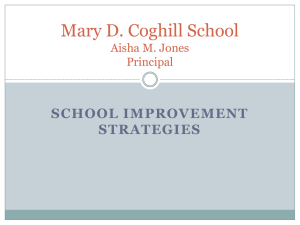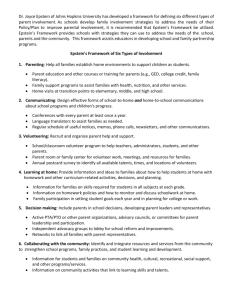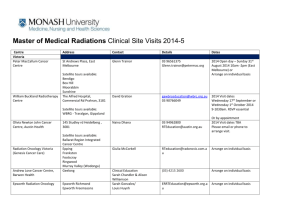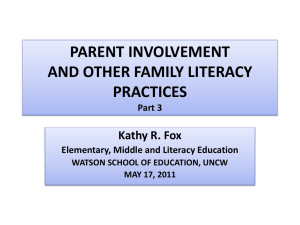Breaking Down Barriers: Reaching Out to All Parents
advertisement
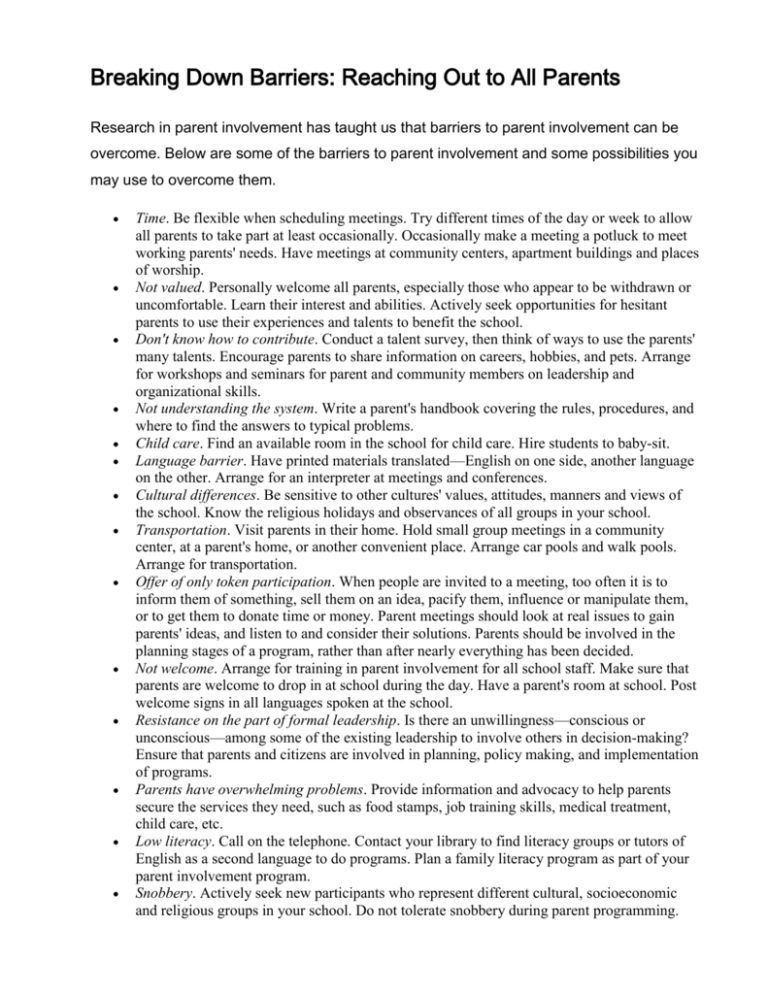
Breaking Down Barriers: Reaching Out to All Parents Research in parent involvement has taught us that barriers to parent involvement can be overcome. Below are some of the barriers to parent involvement and some possibilities you may use to overcome them. Time. Be flexible when scheduling meetings. Try different times of the day or week to allow all parents to take part at least occasionally. Occasionally make a meeting a potluck to meet working parents' needs. Have meetings at community centers, apartment buildings and places of worship. Not valued. Personally welcome all parents, especially those who appear to be withdrawn or uncomfortable. Learn their interest and abilities. Actively seek opportunities for hesitant parents to use their experiences and talents to benefit the school. Don't know how to contribute. Conduct a talent survey, then think of ways to use the parents' many talents. Encourage parents to share information on careers, hobbies, and pets. Arrange for workshops and seminars for parent and community members on leadership and organizational skills. Not understanding the system. Write a parent's handbook covering the rules, procedures, and where to find the answers to typical problems. Child care. Find an available room in the school for child care. Hire students to baby-sit. Language barrier. Have printed materials translated—English on one side, another language on the other. Arrange for an interpreter at meetings and conferences. Cultural differences. Be sensitive to other cultures' values, attitudes, manners and views of the school. Know the religious holidays and observances of all groups in your school. Transportation. Visit parents in their home. Hold small group meetings in a community center, at a parent's home, or another convenient place. Arrange car pools and walk pools. Arrange for transportation. Offer of only token participation. When people are invited to a meeting, too often it is to inform them of something, sell them on an idea, pacify them, influence or manipulate them, or to get them to donate time or money. Parent meetings should look at real issues to gain parents' ideas, and listen to and consider their solutions. Parents should be involved in the planning stages of a program, rather than after nearly everything has been decided. Not welcome. Arrange for training in parent involvement for all school staff. Make sure that parents are welcome to drop in at school during the day. Have a parent's room at school. Post welcome signs in all languages spoken at the school. Resistance on the part of formal leadership. Is there an unwillingness—conscious or unconscious—among some of the existing leadership to involve others in decision-making? Ensure that parents and citizens are involved in planning, policy making, and implementation of programs. Parents have overwhelming problems. Provide information and advocacy to help parents secure the services they need, such as food stamps, job training skills, medical treatment, child care, etc. Low literacy. Call on the telephone. Contact your library to find literacy groups or tutors of English as a second language to do programs. Plan a family literacy program as part of your parent involvement program. Snobbery. Actively seek new participants who represent different cultural, socioeconomic and religious groups in your school. Do not tolerate snobbery during parent programming. Seven Elements Common to Successful Parent Involvement Programs The Southwest Educational Development Laboratory looked at programs from 1986 to 1989 and attempted to identify the characteristics of "promising parent involvement programs." Here are the results (Williams and Chavkin, 1989): Written policies. The programs had written policies that showed parent involvement was viewed as an important component. Administrative support. Administrative support was provided in at-least three ways: funds were made available in the district office budget; materials, space and equipment were available; people were designated to carry out programs. Training. Promising programs made ongoing training available for staff as well as parents. Partnership approach. There was joint planning, goal setting, and so on. Both parents and staff developed a sense of ownership. Two-way communication. Communication between home and school occurred on a regular basis. Parents felt comfortable coming to school, sharing ideas, and voicing concerns. Networking. Promising programs networked with other programs to share information and resources. Evaluation. Regular evaluation activities were included at key stages as well as at the conclusion of a phase or cycle The Basics of Parent and Family Involvement The most basic statement that can be made about parent and family involvement in education is that when it happens, everyone benefits. Research has conclusively shown us that parent involvement in education benefits students, parents, teachers and schools, whether the program is at the preschool, elementary or high school level. Benefits of Parent Involvement for Students The benefits of parent involvement for students are: More positive attitudes toward school; Higher achievement in reading; Higher quality and more grade appropriate homework; Completion of more homework on weekends; and Observing more similarities between family and school. (Epstein, 1991) Benefits of Parent Involvement for Parents and Community The benefits of parent involvement for parents and community are: Receive ideas from school on how to help children; Learn more about educational programs and how the school works; Become more supportive of children; Become more confident about ways to help children learn; and More positive views of teachers (Epstein, 1992; Henderson, 1987; Liontos, 1992). Benefits of Parent Involvement for Teachers and Schools The benefits of parent involvement for teachers and schools are: Teacher morale improves; Parents rate teachers higher; Teachers rate parents as more helpful; Student achievement improves; and Parents support schools and bond issues (Davies, 1988; Epstein, 1992; Liontos, 1992). Assumptions Upon which Successful Parent Involvement Programs Are Built Parent involvement in education is not new. Head Start brought parent involvement into the spotlight in 1965, and since then thousands of parent involvement programs have been implemented. Research on successful parent involvement programs shows us that effective parent involvement programs are built on the following assumptions (Henderson, 1987): The primary educational environment comes from the family. Parent involvement in a child's education is a major factor in improving school effectiveness, the quality of education, and a child's academic success. The benefits of parent involvement are not confined to preschool or elementary school, but extend on up through high school. Low-income and minority children have the most to gain when schools involve parents.



